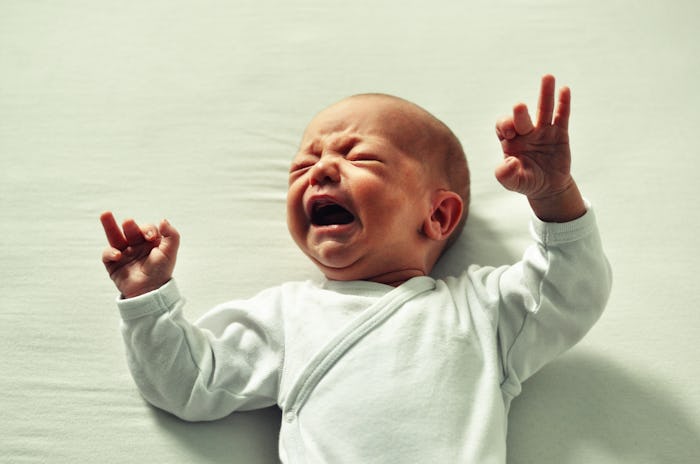It’s 3 a.m. and you hear your baby’s cries across the monitor. You click into mom mode and roll out of bed to attend to your little one's needs, checking his diaper, and making sure he is fed. But for some mothers, their wailing baby makes them feel panicked and they wonder, "What does it mean if my baby's cries make me feel anxious?" Experts say the feeling isn't uncommon.
"I get light-headed, nauseated, and feel the flight urge, almost like I need to escape my body," Brianna Markham, 32, of Pittsburgh, Pennsylvania tells Romper about her 17-month-old daughter Phoebe's cries. "This panic is usually accompanied by feelings of sadness or guilt. I feel so sorry that my poor baby is crying and would do anything to take her pain away."
Dr. Sarah Allen, a psychologist and director of the Postpartum Depression Alliance, says in an interview via email that Markham’s experience isn’t unusual and can be especially typical in mothers who are dealing with postpartum depression and anxiety, or recovering from a traumatic childbirth.
"Having a baby changes the structure of the brain so that regions that control empathy and anxiety have increased activity," Allen says. "That, along with hormonal changes, can make new moms react to a baby’s cry with intense feelings of protectiveness and worry."
For mothers who experience a trauma during birth, Allen says the mama bear instinct increases "because they were primed by the belief that something bad was going to happen to the baby or themselves."
Following the birth of her daughter, Markham was diagnosed with postpartum anxiety and panic disorder that, through therapy, she discovered was the result of unaddressed anxiety issues in her youth and young adulthood. In addition to "time" and therapy, Markham says she takes an antidepressant to help manage her anxiety.
When a wailing baby stirs anxious feelings, Allen recommends a mother first take a few deep breaths by inhaling through the nose to the count of three, then slowly exhaling through the mouth to the count of four. This "activates a chemical in your brain to calm these physical responses down," she says. Once panic has subsided, Allen says a mother will be better able to assess the situation.
"Crying is the main way our baby communicates with us, but it doesn’t always mean there is something terrible happening. He may just be uncomfortable or bored," she says.
When the crying doesn't quickly subside and becomes overwhelming, the Mayo Clinic also suggested a mother take a timeout by placing her baby in a safe spot, like a crib or bassinet. "Let your baby cry while you take a few minutes to regroup in another room," the article noted.
It also helps, Allen says, for a mom to remind herself of the times she has successfully calmed her baby and that there is a learning curve to deciphering a baby's cries. And another thing to keep in mind? Sometimes a crying baby has everything she needs — food, clean diaper, good health, and loving arms — and will still cry. To that Allen says, "Stay calm. The crying will stop." Which hopefully means your anxiety will, too.
